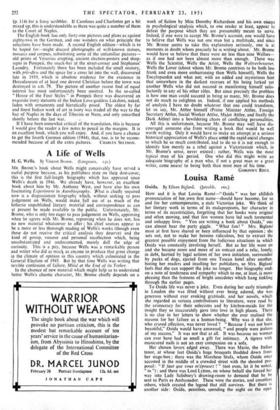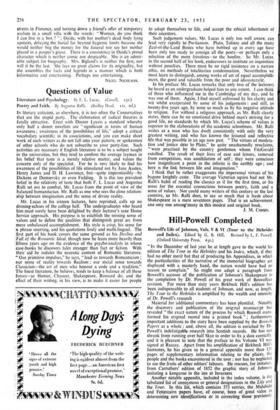Louisa Ramo
Ouida. By Eileen Bigland. (Jarrolds. 16s.)
How sad it is that Louisa Rame—" Ouida " was her childish pronunciation of heriown first name—should have become, for us and for her contemporaries, a stale Victorian joke. We think of her literary work in terms of its malapropisms, her character in terms of its eccentricities, forgetting that her books were original and often moving, and that few women have led such tormented and unhappy lives. " You are writing a book about Ouida," one can almost hear the party giggle. ".What fun! " Mrs. Bigland must at first have shared or been influenced by that opinion ; she sets out, not to make her heroine ridiculous, but to extract the greatest possible enjoyment from the ludicrous situations in which Ouida was constantly involving herself. But as her life wore on and she became more and more of an outcast and a relic, lonely, in debt, harried by legal actions of her own initiation, surrounded by packs of dogs, ejected from one Tuscan hotel after another, boring her readers and insulting her publishers, so Mrs. Bigland feels that she can support the joke no longer. Her biography ends on a note of tenderness and sympathy which to me, at least, is more pleasing than the festoons of bright anecdotes which hang tinkling through the earlier pages.
To Ouida life was never a joke. Even during her early triumphs in London she was feted without ever being adored, she was generous without ever evoking gratitude, and her novels, which she regarded as serious. contributions to literature, were read by the aristocracy for their solecisms and by kitchen-maids for the insight they so inaccurately gave into love in high places. There is no clue in her letters to show whether she ever realised the reasons for her failure as a human-being. Why was it that she. who craved affection, was never loved ? " Because I was not born beautiful," Ouida would have answered, " and people were jealous of my success." It was not that at all. It was because no woman can ever have had so small a gift for intimacy. A tigress with manicured nails is not an easy companion on a sofa.
Her chosen lovers edged away. There was Mario, the Italian tenor, at whose feet Ouida's huge bouquets thudded down from her stage-box ; there was the Marchese Stufa, whom Ouida once accosted in the middle of a crowded street with the shouted pro- posal: "II taut que vous neepousez!" (not even, let it be noted. "rn "): and there was Lord Lytton, on whose behalf she forced her way into Lady Salisbury's drawing-room to demand that he be sent to Paris as Ambassador. These were the stories, and countless others, which created the legend that still survives. But there is another side: Ouida, penniless, spending the night on the open
streets in Florence, and turning down a friend's offer of temporary asylum in a small villa with the words: " Woman, do you think I can live in a box ? " ; Ouida, with her mother's dead body lying upstairs, delaying the burial far beyond hygienic limits because she would neither beg the money for the funeral nor see her mother placed in a pauper's grave. There is a consistency in Ouida's proud character which is neither comic nor despicable. She is an admir- able subject for biography. Mrs. Bigland's is neither the first, nor will it be the last. She lays no great claims for its originality, but she assembles the facts and legends in a manner which is both informative and entertaining. Perhaps too entertaining.
NIGEL N !COLSON.







































 Previous page
Previous page